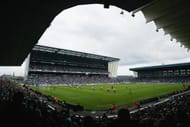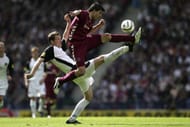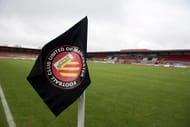There's no denying that fans are a huge part of football. No professional club could ever hope to survive if it wasn't for the loyal supporters. After all, these are the people who part with their hard-earned cash each week to watch their heroes in action.
But some clubs' fans have taken their importance to the next level, especially in Britain. Either out of necessity or frustration, groups of supporters have clubbed together, pooling their time and money to forge a new club.
Supporters' groups have shown time after time that they have what it takes to set up a new club. Whether it's rising from the ashes of a beloved team that have fallen afoul of financial difficulties or starting up a new club in protest, Britain has a long, proud history of fans taking the initiative.
Here are five British clubs set up by fan groups.
#5 Chester FC
The city of Chester in Northern England was once represented by Chester City FC, a professional club with a long, proud history. They had played in the English Football League, won the Football Conference and helped to launch the careers of legendary players like Welsh international Ian Rush.
But a series of unscrupulous chairmen sent the club nosediving through the leagues. They began the 2010/11 season with a 25 point deduction after going into administration, before suffering expulsion from the league after breaking financial rules. With no league to play in, and no money to fund running costs, Chester City ceased to be in March 2010.
Chester fans had been prepared for this eventuality. They had already been protesting Chester City games and acknowledging their beloved club was doomed, they had begun planning a phoenix club.
Chester FC began to play the very next season in the eighth-tier of English football, winning their first league game 6-0. The club quickly won a series of promotions and now play in the National League North, England's sixth tier. They managed to retain use of Chester City's old Deva Stadium and play in the same blue and white kits, very much maintaining the spirit of the original club.
#4 Maine Road FC

When a group of Manchester City fans formed a Sunday League team back in 1955, they probably didn't expect their recreational side to take off in the way that it did. But a series of successful seasons for the fan group led to them gradually climbing the football ladder until they became one of the better known semi-professional sides in the country.
Now playing in the 10th tier of English football, Maine Road have their own small stadium and regularly compete in the FA Cup and other national competitions. In recent years, they've become known as a hotbed for player development. Former Maine Road defender Joel Senior earned a move to Premier League side Burnley in May.
Maine Road still maintain strong links with Manchester City fans. In fact, the official Blues supporters' group signed on to be Maine Road's main shirt sponsors.
#3 Gretna 2008

Gretna FC were based in Scotland, but only just. With their stadium only a few miles north of the English border, the club played in the English non-league system for most of their history.
This changed in 2002 when the club switched to playing in Scotland, joining the country's fourth-tier league. Gretna's success was extraordinary; beginning in 2005, they won three successive promotions and soon found themselves in the Scottish Premier League facing off against Celtic and Rangers. They also reached the Scottish Cup final before losing out on penalties in the final.
But Gretna's rise through the leagues was the beginning of the end. When the club's owner fell ill and withdrew his financial backing, Gretna did not have the resources to compete at the top level. Their stadium was not good enough to host top-flight football, and they were forced into ground sharing at Motherwell. They at one point attracted an attendance of only 431, the lowest attendance ever recorded in the Scottish Premier League. Gretna were relegated and soon declared bankruptcy and folded.
With the old club gone, a community group sprung into action, re-forming Gretna 2008 in order to continue their town's football legacy. Initially playing out of town, the new club returned to their traditional home a year later and are now members of Scotland's fifth tier Lowland League. Although they're yet to reach the heights of their predecessors, they are only one promotion away from a return to the Scottish Football League.
#2 AFC Wimbledon

In 2001, former Premier League club and one-time FA Cup winners Wimbledon FC made a shock announcement. The club would be moving away from their historic London base, relocating more than 50 miles north, to the new town of Milton Keynes. Wimbledon would go on to change almost every aspect of their identity; their colours, badge and even their name playing as MK Dons.
Wimbledon's fans were left without a team to support. Although the club they had followed still technically existed, MK Dons were so different from the original as to be an entirely new entity. Besides, they played miles away from their traditional home.
Wimbledon fans met in a local pub to decide what was to be done next. It was agreed that a new club should be started to carry on the Wimbledon name. So it was that AFC Wimbledon was born.
The new club began to play in the 9th tier of English football but quickly rose through the ranks until they reached the Football League in 2011. AFC Wimbledon are now a fully professional club playing in League One, England's third tier competition. They've even come up against MK Dons in league matches which has been known to cause a few problems.
#1 FC United of Manchester

In the early 2000s, Manchester United fans were growing restless. With large sections of the traditional working-class fanbase unable to watch their team thanks to rising ticket prices, supporters grew increasingly unsettled when American tycoon Malcom Glazer took over the club.
To ensure the spirit of Manchester United lived on in the community unsullied by the vast amounts of money at the top level of football, 4,000 United fans met and pledged money to start a new club which would be operated for fans and by fans, providing affordable football for everyone.
FC United of Manchester began to play in 2005, competing in the tenth tier of English football. Thousands of fans flocked to games and the club won promotion after promotion as well as enjoying success in the FA Cup and opening their own purpose-built stadium.
Last season, FC United were relegated from the National League North, a sixth tier league. But the club still benefit from some of the strongest support outside of professional football and it is surely only a matter of time before the good times return.
